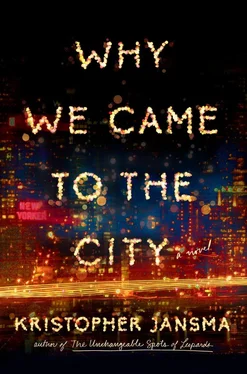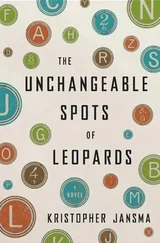Just before she turned to catch Jacob’s eye, he looked down, studying a chessboard, which had been abandoned midgame. He tried to work out who was winning. Black’s king was in a much safer position, but White was outflanking along the left side. He studied the board a little longer, trying to see what moves were coming up, but became stuck. He didn’t know whose turn it actually was. If it was White’s move, then White was in trouble, as both bishops were being threatened. But if it was Black’s turn, even if he did take either of the bishops, there was no move that wouldn’t leave his queen exposed to the White knight… Jacob felt his phone buzz twice.
Sara texted him now three or four times a week. When are you coming up to Boston? Write me a poem! Are you still dating that doctor? Why don’t you quit that stupid job and come up here to be a lobsterman? His responses were absolutely minimal. Where? No. Yes. Gross. She was very excited about the U.S. team’s chances for gold in Vancouver, wasn’t he? He’d typed a reply about how he’d been boycotting the Olympics since A.D. 393 when Emperor Theodosius had kicked out the pagans, but then he deleted it. How could she be bubbly? How could she be watching sports?
He was still annoyed that Sara had flipped out at him for not showing up at Irene’s wake last month (even though he’d said he wouldn’t come several times). Jacob hadn’t seen the point in getting drunk with a lot of arty scenesters who didn’t even know Irene except as the girl who took their coats at events. Jacob imagined them all standing around with their cocktails, sweating under layers of wool, wondering where is the damn coat-check girl ? When the pictures went up on Facebook the next day, he was glad he hadn’t gone. How dare everyone be smiling? How dare they stand around in their Louboutin shoes, clutching their Michael Kors clutches with fucking lipstick smears on the rims of their goddamn plastic cups, playing a bunch of upbeat songs off Irene’s iPod?
Who were all these people? If these were her friends, where had they been all year? How dare they enjoy themselves while what was left of Irene sat on a back wall shelf in that monstrous, tacky metal urn that George had picked out from the funeral home catalog? A room full of artists, and nobody could sculpt a goddamn urn to put her in? Knowing that crowd, it was probably lucky her ashes weren’t suspended ironically in a bottle of urine. What a seismic waste of time, money, talent, and life.
Now Sara was talking about working with Juliette and Abeba to open a big show of all the artwork that Irene had left behind. To Jacob, this was the most unbearable. Not that he would expect them to understand. She’d made these things because she loved making them. For her, it had never been about getting recognition or selling pieces to collectors. Her work belonged in a museum. In its own museum. He ought to do it himself. Hang it all up somewhere in perfect spotlighting and then padlock the door before any else could ever see it.
Sara just wanted to let it all go. Paste it into scrapbooks and move on. Start a new life in Boston as Mrs. George Murphy, a woman unpained. She kept bugging him about meeting her to go through the storage units and Irene’s old books to figure out which should be kept and which should be donated. She kept asking if he’d reach out to William, who hadn’t been heard from since the wake. At least in the photos he had the decency to look as if he hadn’t eaten all month. Sara and George, on the other hand, had been radiant — and Sara, with her new haircut! An edgy flapper bob to go along with her new job as social media director for The New Bostonian . George with his stupid Harvard Crimson bowtie. Jacob couldn’t stand it. They, of all people, ought to understand. Irene cuts our hair! he’d wanted to write in the comments section. George, what’d you do with the suit Irene hemmed? But he wouldn’t snap. Let them wonder why.
“Wouldn’t have pegged you as a chess fan, Jacob,” Dr. Feingold said. “You any good?”
Jacob looked up and realized that he was alone in the room with the doctor.
“I’m actually Bobby Fischer in disguise,” he said. “Don’t tell anybody.”
“I think Bobby Fischer died.”
Jacob held his finger to his lips.
Dr. Feingold stroked his bald spot for a moment. “Listen. You’re Jewish, aren’t you?”
“Jacob Blaumann?” he laughed. “Irish Catholic, through and through.”
He grinned. “Hey. Sissy mentioned what happened to your friend.”
“Did she?”
“She sort of brought it up in our last doctor’s meeting.”
“I thought Sissy just had like an MFA in knitting or whatever.”
Dr. Feingold smirked. “Look, I was just wondering if you’d been to synagogue. I thought you might not know of a good one up here.”
“Thanks, but I’m not a templegoer, really.”
Still, Dr. Feingold looked quite serious. “You should go. Be with other people. Say the Mourner’s Kaddish and all that. Sure it’s all a little dusty, but they wouldn’t be traditions if they didn’t do something for the people who say them. My father passed away a few years ago. Pancreatic cancer. Brutally painful, but at least it’s fast, since there’s nothing you can do for it.”
“Sure,” Jacob said, fishing his phone out of his pocket as if it had just buzzed. The text message he’d received was indeed from Sara. I’m sending out Save the Date cards… He jammed the phone back into his pocket. It buzzed again, but he already knew what the second message would say: What’s your address?
Jacob hadn’t even been to his apartment under the church since December, nor to the city at all. He didn’t know anybody there anymore.
“Anyway, after my father passed, my rabbi told me I should take the year off. No big life decisions. No changing jobs, no starting new relationships, no moving to a new city.”
“Sure. That seems smart. Wait for everything to settle. Well, that seems — sure.”
But the last thing Jacob wanted to do was stay in this dead-end job. It was long past time to move on. Ever since Irene, he’d entertained a thousand escape routes. Heading up to Boston to be closer to George and Sara. Backpacking the Appalachian Trail. Joining a cult in Costa Mesa. Dusting off his old thesis and reapplying to Yale. Like crying, it seemed nice in theory, he was just out of practice.
“So?” Jacob asked.
“So what?”
“So how’d it go?”
Dr. Feingold thought about it. Finally he said, “Well, I’m still here.”
MARCH
Ward III was where patients came after being at Anchorage House for more than thirty days. Most kids were in and out in under a week, referred via psych consults and crisis managers and social workers and court orders. Oftentimes they just needed a break: an orderly schedule, a little counseling, an empathetic group session, and the usual medications. Lots of kids came in on stuff; lots had stopped taking whatever they were meant to be on. A couple of days, a week, and most had their heads screwed back on again. In Ward II, they could chill for twenty-one additional days. There the docs did what they could for the kids and then either released them, transferred them to special clinics, or moved them up to Dr. Boujedra’s group on Ward III. Long-term parking.
The Ward III kids were neither well enough to go home nor sick enough to be shipped out. Languid, world-weary, they sat wistfully in psychiatric purgatory while others came and went. A few kids had been there for over a year, their parents happy to foot the bill and keep them safe, not to mention out of their own hair. Some had even come to feel at home, waiting for their Godots while trained professionals took a daily interest in their thoughts and feelings. Not like the real world was so fantastic anyway. Jacob sometimes saw the appeal; who wouldn’t want to be constantly around people who were always hoping you’d soon be well?
Читать дальше












